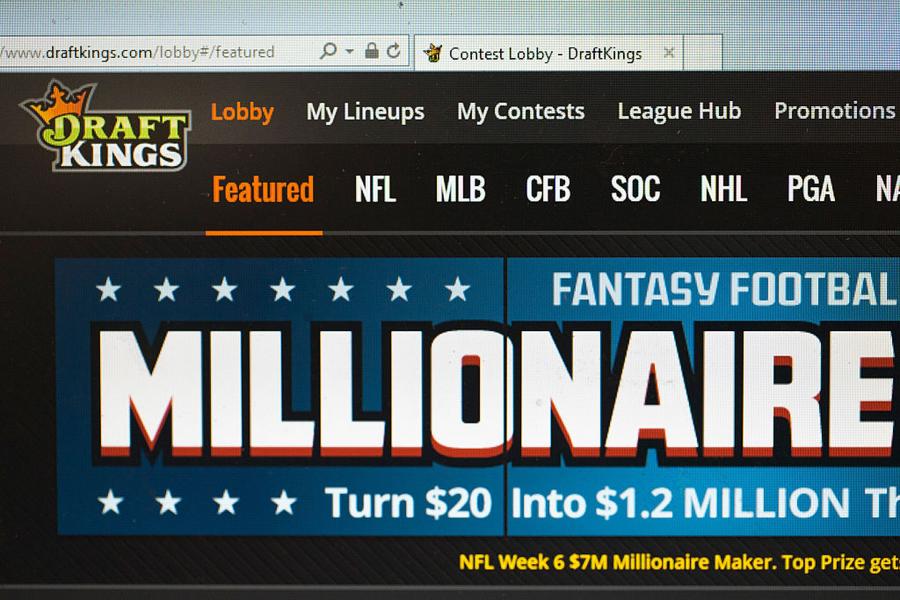Football has finally made its glorious return to the world, and for once we can finally talk about actual games instead of listening to a talking head ramble on about ball pressure.
Of course, along with the actual on-field product, fantasy football is making a return. The "old-school" version, in which participants draft a team of players at the beginning of the season, then manage their squad throughout the year, is still alive and well.
In recent years, the season-long version has also been joined by daily fantasy leagues. Rather than managing a team over the course of the season, daily fantasy players get a set amount of money, then set their roster in any way they'd like, so long as they fill all the position requirements and come in under budget. You want to snag Andrew Luck and Dez Bryant? That's great, do it! But just keep in mind the rest of your team will mostly consist of players in smaller roles, since those two cost a lot.
The two biggest leagues like that are DraftKings and FanDuel, each worth more than $1 billion. Daily fantasy is popular because it spans only one day (or one week), so it's the perfect fit for players who don't have the time to commit to a season, have been knocked out of the playoffs, or absolutely love to gamble.

Scott Olson/Getty Images
You see, DraftKings and FanDuel have made their money by… well, taking other people's money. In order to play, you must put a deposit down. And the different kind of leagues only reward a small portion of participants; the rest are plopping money on the (virtual) table, only to see it disappear. It's an extra-condensed version of gambling: you're making bets that your roster will win you money. Gambling is illegal in states outside of Nevada, Montana, Oregon and Delaware. Yet daily fantasy football is completely legal. How can that be?
It's thanks to a little loophole in the law: In 2006, the federal government passed the Unlawful Internet Gambling Enforcement Act, establishing fantasy sports as a game of skill, not a game of chance. This law says a game is legal if it's not solely dependent on the outcome of any single sporting event or non-participant's singular individual performance in any single sporting event, or if it has an outcome that reflects the relative knowledge of the participants, or their skill at physical reaction or physical manipulation (but not chance), and, in the case of a fantasy or simulation sports game, has an outcome that is determined predominantly by accumulated statistical results of sporting events, including any non-participant's individual performance in such sports events.
Run-on sentences aside, this is definitely a gray area. Because you're building an entire roster of players, and you're scoring points based on how they perform on the field, the law classifies this as the kind of game that requires actual skill to win. Any players who have been in a league where the first-timer who took a kicker in the third round ends up winning it all will certainly argue otherwise.
Regardless of what you think about daily leagues, they're not going away anytime soon. FanDuel, which generates almost twice the revenue that DraftKings does, brought in nearly $57 million in 2014. Though the companies spend a ton of money on advertising; ESPN has become an investor in DraftKings (up to a 20% stake), but millions of those dollars will come back to the network over the next three years in the form of ads and sponsored content. It's nearly impossible to read an ESPN advice article on fantasy football without some mention of DraftKings or daily fantasy. FanDuel has plenty of investors, too, ranging from NBC Sports Ventures to Google Capital and Time Warner Cable Ventures.
/2017/06/GettyImages-492972826.jpg)
/2014/12/GettyImages-492972814.jpg)
/2021/03/GettyImages-1028725384.jpg)
/2015/09/GettyImages-492972824.jpg)
/2025/01/GettyImages-2196101890.jpg)
/2023/05/GettyImages-1453522874.jpg)
/2025/03/DUSTIN-LYNCH.jpg)
/2019/10/Troy-Aikman.jpg)
/2010/04/Emmitt-Smith-1.jpg)
:strip_exif()/2020/06/taylor.png)
/2010/02/Jennifer-Hudson.jpg)
/2009/12/Troy-Polamalu.jpg)
/2019/09/jg.jpg)
/2022/02/Dan-Bongino.jpg)
/2012/07/Laila-Ali.jpg)
/2009/11/Ciara-1.jpg)
/2010/09/Gloria-Estefan.jpg)
/2022/01/Jane-Birkin.jpg)
/2011/02/Brigitte-Bardot.jpg)
/2014/04/noel-edmonds.png)
/2025/01/amanda.jpg)
/2010/12/Adrian-Peterson-1.jpg)
/2012/07/GettyImages-508683722.jpg)